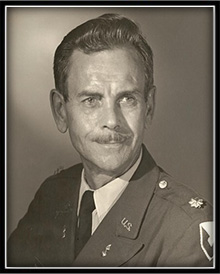Colonel Frank M. Philips, Jr.
 After enlisting in the USA two years earlier, Colonel Frank M. Philips, Jr. attended Ordnance Officer Candidate School in 1942, graduated from the U.S. Army Bomb Disposal School the same year and the U.S. Navy EOD (Special Weapons Disposal) School in 1952. His early assignments included deployment to France, Holland, Belgium, and Germany where he led soldiers in the removal of unexploded ordnance from battlefield tanks and vehicles and disposed of over 880 tons of allied and German munitions, demolishing nearly half of it. Upon return, Captain Philips transitioned into the Army Reserves until he was recalled to Active Duty in 1952 for the Korean War.
After enlisting in the USA two years earlier, Colonel Frank M. Philips, Jr. attended Ordnance Officer Candidate School in 1942, graduated from the U.S. Army Bomb Disposal School the same year and the U.S. Navy EOD (Special Weapons Disposal) School in 1952. His early assignments included deployment to France, Holland, Belgium, and Germany where he led soldiers in the removal of unexploded ordnance from battlefield tanks and vehicles and disposed of over 880 tons of allied and German munitions, demolishing nearly half of it. Upon return, Captain Philips transitioned into the Army Reserves until he was recalled to Active Duty in 1952 for the Korean War.
In 1956 Major Philips was assigned to the Pentagon where he fought for and won a Bomb Disposal position to be represented on the Army Staff. He was also a member of the team who designed the current EOD Badges.
LTC Philips received his first Legion of Merit for managing the US Army Materiel Command's Explosive Ordnance Program from 1964-67. While there he served as Chairman of the 1966 EOD Tripartite with representation from Canada, United Kingdom, and the United States. He was responsible for providing updated and new information on US EOD Operations to all participants to enable proper coordination among various allied nations. He also served as the International Chairman of the NATO Panel of EOD Experts making several trips to Europe to represent the U.S. Army. LTC Philips' well deserved authority as an expert in the field of EOD and his outstanding achievements during this period established a challenging record for those to follow.
LTC Philips was personally selected as the Chief, Data Collection, U.S. Army Wound Data & Munitions Effectiveness Team (USAWDMET), Republic of Vietnam. His team meticulously collected actual information from 7,989 patients with minor to fatal wounds over a 16-month period. As a result, they were able to compute the effectiveness of Chinese and Russian weapons; provide recommendations for improvements in protective gear (body armor, helmets, and boots) for American soldiers; and provide a lasting standard against which all future epidemiologic studies of combat injuries must be judged.
Colonel Philips' last assignment was as Special Assistant to the Pueblo Army Depot Commander, as well as Commanding Officer of the Navajo Army Depot, Gallup NM and Wingate Army Depot, Williams AZ with the mission to reduce operations to a War Reserve status.
As a result of his leadership, vision, innovation, and superior performance, Colonel Frank M. Philips, Jr. made a lasting impact on the EOD Branch, Ordnance Corps, and the United States Army. He retired at Ft. Carson, CO on April 30th, 1971, and passed away on April 2nd, 1974.